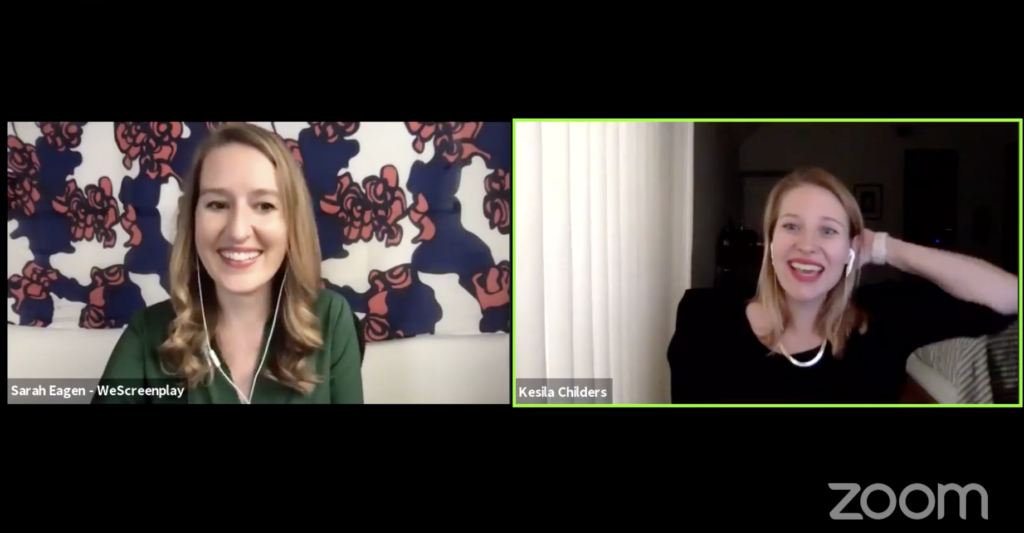 Kesila Childers, VP of Development for Paul Feig’s digital content company Powderkeg, sat down to talk with Sarah J Eagen for WeScreenplay’s ongoing Cocktails & Conversations virtual events. Powderkeg is a company that aims to champion new voices with a commitment to female, LGBTQ creators, and filmmakers of color. Childers also currently sits on the jury for WeScreenplay’s Diverse Voices Contest.
Kesila Childers, VP of Development for Paul Feig’s digital content company Powderkeg, sat down to talk with Sarah J Eagen for WeScreenplay’s ongoing Cocktails & Conversations virtual events. Powderkeg is a company that aims to champion new voices with a commitment to female, LGBTQ creators, and filmmakers of color. Childers also currently sits on the jury for WeScreenplay’s Diverse Voices Contest.
In the hour-long conversation, Childers shared numerous tips to help a writer’s career thrive. You should watch the whole thing, but if you don’t have time, here are four key takeaways about how development executives find writers and what you can do to launch your screenwriting career.
Join us for a chat with Dev Exec Kesila Childers!
We hosted a chat with development executive Kesila Childers! Kesila is Vice President of Development for Powderkeg, Paul Feig‘s digital content company that aims to champion new voices with a commitment to female and LGBTQ creators and filmmakers of color.Kesila also currently sits on the jury for our Diverse Voices Contest.
Posted by WeScreenplay on Thursday, September 10, 2020
Table of Contents
How do development execs find new screenwriters?
When asked what Powderkeg does to find new voices, Childers said they look everywhere from film festivals to viral videos, to Vimeo, as well as submissions from agents and managers. At the end of the day, it’s all about the specific voice of the writer. Childers revealed that when a writer has created a strong, unique voice she wants to see more.
She heard it said on the Scriptnotes podcast that it’s important to create a character that is so clear, “Your audience should know what ice cream flavor your character’s going to order at any given time.” [19:00]
She also mentioned that the specificity of a writer’s voice is vital in the pitching process and that writers need to be thinking about how their script will be sold. “Make sure you know why you are telling the story and make sure they know why. Why you and why now.” That’s what she is always looking for. [50:12]
Make your first ten pages fantastic
The first ten pages of your script or treatment are essential. “If you can’t get a friend to love the first ten pages, no development exec is ever going to go past that.” [37:10] To help hone your first ten pages, Childers recommends reading a lot of scripts because “you can’t break rules you don’t understand.”
Are you holding on too tightly?
Writers can fall into any number of pitfalls when they’re working on a script. Luckily, Childers shared some words of wisdom she heard from showrunner Monica Breen to help writers avoid the most common missteps. Breen found that “writers are often trying to preserve something that’s being rewritten instead of trying to build something.” Childers reiterated that it’s important to recognize if you are holding on, or building where your story truly needs to go.
What is Powderkeg currently looking for?
Because Paul Feig is the head of the company they are primarily interested in comedy and have a special mandate for underrepresented voices. Childers said they are “looking for stories that fit [their] brand that haven’t been told.”
Are you building relationships, being kind, and writing every day?
Kesila also had a number of words of wisdom for life in the industry including that it’s a people-driven industry and “you have to be willing to have those connections” because “at the end of the day, every job [she’s] ever had in this industry has been because [she] was able to talk to somebody” and they thought she’d be a good fit.
She also stressed the importance of writing every single day whether that’s even just one page, a rewrite, or coming up with a logline and that it’s vital to go live life and go experience things. “That real-world experience of just living life is really worth something.” [1:00:20]
When talking about what tv and film content will look like going forward she stated that “in television at least, writers hold the power” and as people rise to the top of the chain, “we’ll see a more fully realized media landscape that matches America” with truly diverse content and voices. [34:20]
Kesila reminded us that “Hollywood is still a place where, as corny as it sounds, dreams can come true and your life can change in a moment. And it takes not only talent but dedication”. [56:30] She emphasized being kind to ourselves and giving ourselves grace. “If you love yourself, it’s going to be easier to put things out there into the world.”
Sign up for the WeScreenplay newsletter for more tips and tricks from industry insiders.

Helenna Santos is an actor, writer, producer, and was the founder/editor-in-chief of Ms. In The Biz for its seven-year run. As an actor, she has been seen most recently in CW’s THE FLASH, ABC’s A MILLION LITTLE THINGS, and THE GOOD DOCTOR as well as THE BABY-SITTERS CLUB on Netflix. Helenna produced and starred in the female-driven sci-fi/thriller feature film The Shasta Triangle and the adventure movie At Your Own Risk. Her work as a contributing writer has been featured in MovieMaker Magazine, Backstage Magazine, IndieWire, Film Inquiry, and BUST Magazine, and she can often be found on panels at conventions such as San Diego Comic-Con. Connect with her on Instagram and Twitter!
For all the latest from WeScreenplay, be sure to follow us on Twitter, Facebook, and Instagram.
















